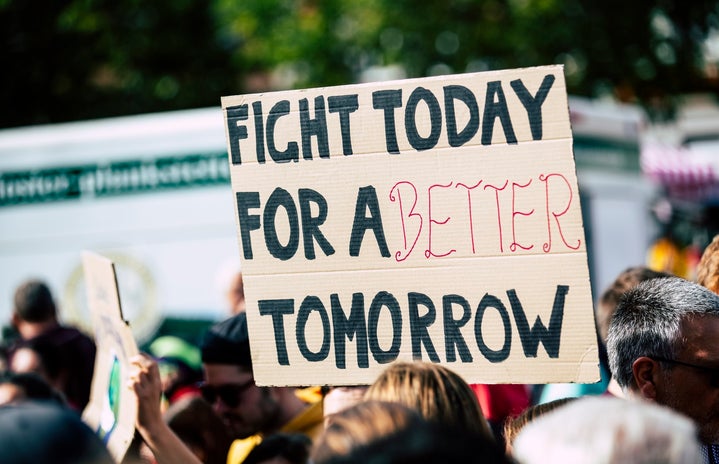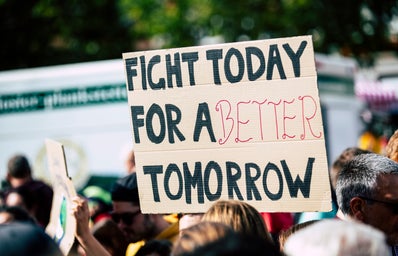As we lead the fight for environmental justice, march for women’s rights, fight for racial equality, demand fair wages, and combat discrimination against the LGBTQAI+ community, it’s easy to be discouraged by harmful legislation after harmful legislation. We tend to forget how far we‘ve come already. Although 2020 was a turbulent year, it’s also given us many reasons to be grateful. Let’s take a moment to look back on some of the victories we’ve secured around the world in the last year, and use them as inspiration for all we’ll accomplish in the year to come!
- Argentina legalized abortion
-
In December, Argentina legalized abortions up to the 14th week of pregnancy. This ground-breaking move could have a domino effect on Latin American nations with some of the world’s most restrictive termination laws. Until now, abortions were only legal in cases of rape or when the mother’s health was endangered. Vilma Ibarra, who drafted the law, was overcome with emotion when she told reporters, “Never again will there be a woman killed in a clandestine abortion.”
- Scotland became the first country to provide free period products
-
In November, Scotland became the first country in the world to provide free products for periods. The legislation came after Scottish Parliament changed the way it discussed periods, as well as menopause and endometriosis after a campaign was launched to combat the period stigma. Prior to the initiative, one in five Scottish women experienced period poverty – the struggle to pay for basic sanitary products on a monthly basis.
- France doubled its paid paternity leave to 28 days
-
In an effort to reduce gender inequality, in September, President Macron announced that the National Assembly had voted to double paid paternity leave from 14 to 28 days. Father would be mandated to take at least one week off after the baby’s birth. “When a baby arrives in the world, there is no reason it should be just the mother who takes care of it,” Macron said.
- The United States Supreme Court ruled that civil rights law protects LGBT workers from discrimination
-
On June 15 and in a landmark decision, the Supreme Court ruled that LGBTQ+ workers are protected from discrimination under the Civil Rights Act of 1964. Until the decision, it was legal in more than half of the states to fire workers for their sexual orientation or identity.
- Costa Rica legalized same-sex marriage, while Thailand and Switzerland moved to legalize same-sex unions
-
In May, Costa Rica became the sixth country in Latin America to legalize same-sex marriage when a ruling from the country’s supreme court ended the country’s ban. Many partners celebrated their unions on broadcast TV soon after the ban was lifted.
Meanwhile, in Thailand, the government announced in July that it had approved a draft bill that would give same-sex unions, through “civil partnership,” many of the same benefits as those of heterosexual marriages, including the power to adopt children, jointly own property, and pass on an inheritance. In Switzerland, lawmakers voted in December to legalize same-sex marriage and to allow transgender people to change their legal name. However, this law will likely be tested in a nationwide referendum before it takes effect.
- The Spanish government moved to fine companies perpetuating the gender wage gap
-
Through a decree mandating companies to disclose their employees’ salaries, the Spanish government moved to outlaw the wage gap between men and women, who earn on average 22% less than their male peers. Companies that fail to disclose data face a fine of $220,000.
- Senator Kamala Harris shattered a glass ceiling as she became the United States’ first female, Black, and Asian American vice president
-
In a historic election, Americans voted to usher in a new era of female leadership, with a Black and Asian-American woman in the nation’s second-highest office. President Biden also nominated a team of women experts for his cabinet, including former Federal Reserve chair Janet Yellen as the first female Treasury secretary and Rep. Deb Haaland as the first Native American to head the Interior Department.
- Canada banned assault-style weapons
-
In May, Prime Minister Trudeau of Canada banned assault-style weapons following the worst mass shooting in the country’s history. The decision marks an important victory for gun control activists in a country with one of the highest per capita gun ownership rates in the world. “As long as Canadians are losing their loved ones to gun violence, not enough has changed,” Trudeau said.
- Sudan ratified a law criminalizing female genital mutilation, protecting young women from lifelong physical pain and emotional trauma
-
Sudan’s highest governing body ratified a law criminalizing female genital mutilation. The justice ministry said that the practice “undermines the dignity of women.” Under the new law, doctors who carry out the practice, which involves the removal of the labia and clitoris, often in unsanitary conditions and without anaesthesia, will be penalized and hospitals or clinics where the operation was carried out will be shut down. The criminalization of this practice will protect women from a dangerous, traumatic pratice in a country where nine out of 10 girls are victims of female genital mutilation.
- Two women won the Nobel Prize in Chemistry
-
In October, Emmanuelle Charpentier and Jennifer A. Doudna were awarded the Nobel Prize in Chemistry for their work on a way of editing DNA. The two female scientists led efforts to turn molecules made by microbes into a tool for customizing genes. Their joint win marks the first time in history that the prize has gone to two women, signifying the power of women in STEM — a field that has traditionally offered more opportunities and recognition for men.
- Denmark and Spain agree to define rape as sex without consent
-
As the #MeToo movement has progressed, Europeans are beginning to talk about consent — and governments are listening. This year, the Danish government agreed to amend the Criminal code to recognize that sex without consent is rape and the Spanish government announced a bill to define rape as sex without consent. Changing outdated laws is a major step toward ending the stigma and impunity for sexual violence.
- Greece elected its first woman president
-
Greece made history by electing the country’s first female president, Katerina Sakellaropoulou, in January. Sakellaropoulou was previously known for her work as a refugee rights advocate and the chairperson of an environmental law society. Her appointment is a major step toward equal representation in government for women, after Prime Minister Kyriakos Mitsotakis was criticized for the lack of women represented in his cabinet.
- Sierra Leone and Tanzania lifted bans prohibiting pregnant girls from attending school
-
Discriminatory laws have long stopped girls from finishing their education and put them at risk of falling behind their peers. In an effort to create more inclusive nations, Sierra Leone announced in March that it would end its ban on pregnant girls attending school. In April, Tanzania said it would also start allowing pregnant girls to attend regular school.
- In France, a scandal sparked a movement against incest, prompting a nationwide reckoning and reforms
-
In France, a scandal involving a prominent French intellectual accused of sexually abusing his teenage stepson has prompted a wave of testimonies on social media from people in France who say they were also victims of incest. The #MeTooInceste movement puts faces on frightening numbers: one in 10 French people say they have been the victim of incest.
President Emmanuel Macron said in a video posted on social media that the country would tighten its laws, conduct prevention in schools, and provide free psychological help for survivors to better protect children from sexual violence. “We will go after the aggressors,” Macron said, speaking directly to survivors. “You will never be alone again.”
- Brazil announced equal pay for men and women’s national soccer players
-
As women around the world push to eliminate the gender wage gap, the Brazilian Football Federation announced that the country’s women’s soccer team will receive the same pay as their male counterparts. The policy means every player representing Brazil will receive equal daily rates and prize money when on international duty.
- Germany introduced company quotas to increase the number of female CEOs
-
Germany announced it would introduce a mandatory quota for women in the senior management of listed German companies — management boards with more than three members must in the future include at least one woman. The move is a big step on the road to equality in the country’s workplace.
- The United States Supreme Court ruled in favor of DACA
-
In June, the Supreme Court ruled against President Trump’s attempt to end Deferred Action for Childhood Arrivals (DACA), a program that protects people brought to the United States as children by shielding them from deportation and letting them work. Although the chief justice made clear that the decision was based on procedural issues, the decision still protected about 700,000 young immigrants from deportation.
- China announced a crack-down on single-use plastics
-
The Chinese government has announced a plan to crack down on plastic pollution by 2025. The country committed to phasing out single-use plastic items, including bags and straws, single-use hotel items, and plastic packaging in the postal service. The pledge is an important step to reduce the environmental impact of the country — one of the largest manufacturers of plastic in the world. Still, the ban could have a negative impact on people with disabilities, leaving plenty of room for the work to continue.
- In a groundbreaking interview, Pope Francis endorsed same-sex unions
-
In a documentary called “Francesco,” Pope Francis became the first pontiff to endorse same-sex civil unions, earning praise from LGBT Catholics who have long felt excluded from the church. “Homosexual people have a right to be in a family,” the pope said. “They are children of God and have a right to a family. Nobody should be thrown out or be made miserable over it.” His remarks prompted Venezuela’s president Nicolas Maduro to call on his country to take up the issue of same-sex marriage.
- States across the U.S. passed drug reform laws to limit incarceration
-
In a momentous change, New Jersey, Arizona, South Dakota and Montana voted in November to legalize recreational marijuana, and Oregon became the first state to decriminalize small amounts of cocaine, heroin and other drugs. The new drug reform laws will reduce the number of people incarcerated for low-level drug offenses.
- Wales announced it will build a national forest
-
Wales unveiled a $6 million reforestation project to preserve nature, diversify tree species, restore animal habitats, and improve air quality. The Welsh government said the new National Forest would be a “connected ecological network of woodland,” running through the “length and breadth of Wales.” I, for one, can’t wait to visit as soon as I get my vaccine!
Fighting for social justice is tough, so make sure to check the really good news from time to time, and celebrate the progress that you and millions of people around the world are making happen. In 2021, let’s build on all of these victories, and look out for one another while taking care of our mental health.


